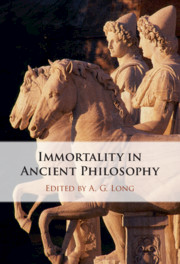Book contents
- Immortality in Ancient Philosophy
- Immortality in Ancient Philosophy
- Copyright page
- Contents
- Contributors
- Introduction
- Chapter 1 The Soul and the Celestial Afterlife in Greek Philosophy before Plato
- Chapter 2 Pythagorean Immortality of the Soul?
- Chapter 3 The Philosopher’s Reward: Contemplation and Immortality in Plato’s Dialogues
- Chapter 4 Pre-Existence, Life after Death, and Atemporal Beings in Plato’s Phaedo
- Chapter 5 The Immortal and the Imperishable in Aristotle, Early Stoicism, and Epicureanism
- Chapter 6 Socrates and the Symmetry Argument
- Chapter 7 Immortality in Philo of Alexandria
- Chapter 8 Plotinus on Immortality and the Problem of Personal Identity
- Chapter 9 Truth and Immortality in Augustine’s Soliloquies and De Immortalitate Animae
- Index of Passages
- Index of Names and Subjects
- References
Chapter 4 - Pre-Existence, Life after Death, and Atemporal Beings in Plato’s Phaedo
Published online by Cambridge University Press: 20 May 2021
- Immortality in Ancient Philosophy
- Immortality in Ancient Philosophy
- Copyright page
- Contents
- Contributors
- Introduction
- Chapter 1 The Soul and the Celestial Afterlife in Greek Philosophy before Plato
- Chapter 2 Pythagorean Immortality of the Soul?
- Chapter 3 The Philosopher’s Reward: Contemplation and Immortality in Plato’s Dialogues
- Chapter 4 Pre-Existence, Life after Death, and Atemporal Beings in Plato’s Phaedo
- Chapter 5 The Immortal and the Imperishable in Aristotle, Early Stoicism, and Epicureanism
- Chapter 6 Socrates and the Symmetry Argument
- Chapter 7 Immortality in Philo of Alexandria
- Chapter 8 Plotinus on Immortality and the Problem of Personal Identity
- Chapter 9 Truth and Immortality in Augustine’s Soliloquies and De Immortalitate Animae
- Index of Passages
- Index of Names and Subjects
- References
Summary
I argue that the conversation in Plato’s Phaedo operates on two levels, and appeals to two different notions of immortality, one temporal (continuing life after death or before birth) and one atemporal (immunity from death, time and all sequential events). Socrates and his friends are concerned about whether the soul will survive beyond the present life, and whether it existed prior to birth. While this looks like a concern about temporal survival, I argue that Plato, as author, is identifying another kind of immortality, proper to the soul alone, as a being outside time, to which 'before' and 'after' do not apply. By examining exactly what is meant by its immunity to death (in a number of senses of ‘death’) and its association with life (in one sense of ‘life’), I consider in what sense the soul could have a kind of atemporal being akin to that which pertains to the Forms, and examine some puzzles about how such a being could enter into temporal experience in conjunction with a sequence of bodies.
- Type
- Chapter
- Information
- Immortality in Ancient Philosophy , pp. 93 - 117Publisher: Cambridge University PressPrint publication year: 2021
References
- 1
- Cited by



